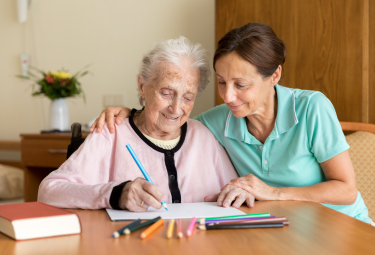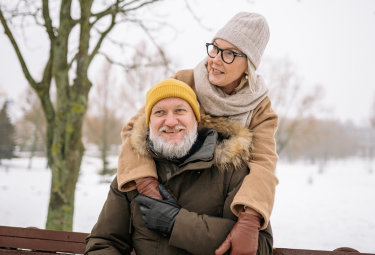8 Health Tips for a Safe and Healthy Holiday
December 23, 2024The holidays are a great opportunity to enjoy time with family and friends, to celebrate life, to be grateful, and to reflect on what’s important. They are also a time to appreciate – and safeguard – the gift of health.
“The holiday season is a time to reflect on family and friends, but don’t forget to take time to care for yourself,” said CDC Director Robert R. Redfield. “We wish you a healthy and happy New Year, and send along some reminders on how best to keep you and your family well this winter.”
Here are some holiday tips to support your efforts for health and safety during the season.
Eat Healthy and Be Active
It can be challenging to eat healthy and stay active during the holidays. Healthy eating is all about balance and moderation. Holiday parties and big family meals may tempt us away from our healthy eating habits. Allow yourself to have your favorite foods but stick to smaller servings and balance them with healthier options. Choose fresh fruit as a festive and sweet substitute for candy. Limit fats, salt, and sugary foods and drinks.
Staying active can help you keep a healthy weight during the holiday season. Look for opportunities to work physical activities into your holiday: Go for a stroll after a family meal, take a walk at the mall, or dance to your favorite holiday music. Aim to get at least 150 minutes a week of physical activity. For example, that could be at least 20 minutes a day or 30 minutes five days a week. It’s important to move more and sit less.
Get Your Flu Vaccination
Influenza (flu) is more than a cold, or even a “bad cold.” It can result in serious health complications like pneumonia, bacterial infections, hospitalization, or death. Few people get vaccinated against flu after the end of November even though flu activity peaks between December and February and can last as late as May. If you didn’t yet get a flu vaccination this season, it’s not too late! CDC recommends that everyone age 6 months and older get vaccinated now if they have not already been vaccinated this season.
Flu vaccination can reduce your risk of getting sick with flu and can prevent serious flu complications. Flu vaccine has other benefits, too, including being life saving for children, protecting pregnant women and their babies, and reducing the risk of heart attack in people with heart disease.
Food Safety
Food poisoning can ruin even the most festive celebrations. Each year, an estimated 1 in 6 Americans get sick from eating contaminated food.
Take simple steps to protect your family’s health when you prepare and serve holiday meals such as:
- Wash your hands and work surfaces before, during, and after preparing food, and before eating.
- Keep raw meat, poultry, seafood, and eggs separated during preparation.
- Cook food at the right internal temperature to kill harmful germs. Use a food thermometer to check.
- Refrigerate perishable foods, including leftovers, within two hours of buying or cooking.
Handwashing
Handwashing is one of the most effective ways to prevent the spread of germs and to keep kids and adults healthy, especially during the winter months. Evidence shows handwashing can help prevent 1 in 5 respiratory illnesses like the cold or flu, so understanding how and when to wash hands is critical for staying healthy.
CDC’s newest handwashing campaign – “Life is Better with Clean Hands” – includes resources and educational materials to help spread the word about the importance of healthy hand hygiene. If soap and water are not available, you can use an alcohol-based hand sanitizer that contains at least 60% alcohol.
Cold Weather Safety and Home Heating
Outdoor activities during cold weather can expose you to several safety hazards, but you can take steps to be prepared while getting the exercise you need.
Start by wearing warm clothing, a wind-resistant coat or jacket, mittens, hats, scarves, and waterproof boots. To protect from hypothermia, don’t forget to dress in layers. Additional safety precautions when participating in outdoor recreation include: always carry a cell phone, work slowly when doing outside chores, sprinkle cat litter or sand on icy patches, and take along a buddy and an emergency kit.
Have your heating system, water heater, and any other gas, oil, or coal burning appliances serviced by a qualified technician every year to keep your family safe from carbon monoxide (CO) poisoning. Install a battery-operated or battery backup CO detector where it will awaken your family at night if the alarm is triggered. Each year, more than 400 Americans die from unintentional CO poisoning not linked to fires, more than 20,000 visit the emergency room, and more than 4,000 are hospitalized.
Cope with Stress
Everyone—adults, teens, and even children – experiences stress from time to time. Feeling emotional and nervous or having trouble sleeping and eating can all be normal reactions to stress. Learning healthy ways to cope with stress and getting the right care and support can help reduce stressful feelings and symptoms. For more information, see Suicide Resources for articles, publications, and additional resources.
Travel Safety
Winter storms and cold temperatures can be dangerous. Stay safe and healthy this winter by planning ahead. Whether you’re traveling across town or around the world, ensure that your trip is safe:
- Get your car ready for cold weather before winter arrives.
- Don’t drink and drive – and don’t let others drive when they’ve been drinking.
- Wear a helmet when riding a bicycle or skateboarding to help prevent head injuries.
- Wear a seat belt every time you drive or ride in a motor vehicle, and always buckle your child in the car using a car seat, booster seat, or seat belt appropriate for their weight, height, and age.
Before traveling abroad, check out health and safety risks at your destination. Don’t forget to get needed vaccinations at least 4 to 6 weeks before you leave to ensure protection by the time you travel. CDC’s latest traveler’s health updates include information about measles and malaria. For more information see Traveling Abroad for the Holidays.
Anyone traveling more than four hours, whether by air, car, bus, or train, can be at risk for blood clots. Blood clots can form in your legs during travel because you are sitting still in a confined space for long periods of time. Protect yourself during the holiday travel season by moving your legs frequently, know the symptoms of blood clots and when to get help and if you are at risk for blood clots talk to your doctor.
Prevent Injuries
Injuries can happen anywhere, and many occur around holidays. Take these steps to avoid common injuries:
- Use step stools instead of climbing on furniture when hanging decorations.
- Leave fireworks to the professionals.
- Wear a helmet when riding a bicycle or skateboarding to help prevent head injuries.
- Prevent chain saw injuries by wearing proper protective clothing and glasses. Always operate, adjust, and maintain chain saws according to manufacturer’s instructions.
Most residential fires occur during the winter months. Keep candles away from children, pets, walkways, trees, and curtains. Never leave fireplaces, stoves, or candles unattended.
Carbon monoxide poisoning is 100% preventable. Don’t use generators, grills, or other gasoline or charcoal-burning devices inside your home or garage.
Brighten the holidays by making your health and safety a priority. These tips will help keep you and your loved ones safe and healthy—and ready to enjoy the holidays.
To learn more, please visit https://www.cdc.gov/media/releases/2019/p1119-8-holiday-tips_1.html.




